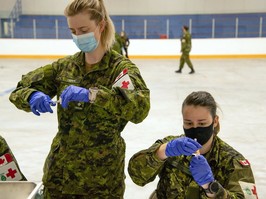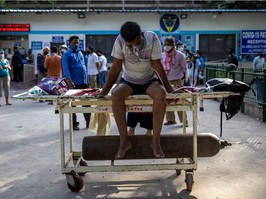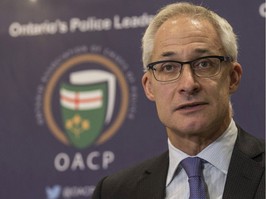opinion: we need a strategy to deal with long covid
research shows about a third of the supposedly recovered patients are readmitted to hospital within a few months.

many people infecgted with covid-19 continue to experience serious symptoms months later.
getty
as we grieve the loss of more than 23,000 canadians to covid-19, we must remember that this disease is not only deadly but also capable of inducing long-term health complications.long covid syndrome (lcs) is characterized by symptoms such as fatigue, brain fog, breathlessness and depression that can last for weeks or months after the initial infection. according to the world health organization, 10-15 per cent of covid-19 patients develop lcs. many previously healthy patients continue to report life-altering symptoms that reduce their quality of life even after seven months.despite the lack of scientific data on the prognosis and disease characteristics of lcs, researchers have been able to determine the demographics that are at an elevated risk of developing it. unsurprisingly, some of these intersect with those who are at an elevated risk of experiencing severe symptoms of covid-19. for example, older adults and individuals with comorbidities are particularly at a higher risk of developing lcs. in addition, women have a 14.9 per cent chance of developing lcs compared to 9.5 per cent for men.we are currently amid a third wave of infections, with many health jurisdictions resorting to field hospitals to manage the record surge in cases. while dealing with the surge, we must ensure that our short- and long-term plans include individuals affected by lcs. current first-hand accounts from patients reveal that they are being overlooked by our health-care system and are regarded as “recovered” patients. however, research shows that about a third of the supposedly recovered patients are readmitted to the hospital within a few months, with about one-tenth eventually dying from covid complications. additionally, systemic organ failure and dysfunction are found to be significantly higher in covid patients following discharge from hospital. it is crucial that we do not discredit these patients as ones with “pre-existing” conditions – recent data demonstrates that even in usually healthy 18- to 34-year-olds, 20 per cent are not able to return to their original state of health three weeks after infection. it is vital to pursue proactive solutions, such as regular surveillance and health monitoring programs, that address the needs of this relatively novel patient population.the best solution is prevention. since the outset of the second wave, many experts have called for provincial governments to actively pursue a zerocovid strategy that aims to minimize caseloads and transmission rates to an absolute minimum. this is in line with policies pursued in the atlantic provinces, australia, new zealand and elsewhere. such a move would be a drastic improvement compared to our current strategy that has thus far primarily focused on reducing caseloads, which inevitably lead to future spikes, rather than eliminating them altogether. such a strategy would include a strict lockdown policy that is supplemented with rigorous testing (including rapid antigen testing) and tracing as well as a more comprehensive and efficient vaccination campaign.recently, the ontario medical association (oma) issued recommendations for what our current pandemic response should look like. the recommendations included a stay-at-home order that only exempts essential travel such as grocery shopping, outdoor exercise and medical appointments. additionally, the oma recommends that vaccination plans focus on those most susceptible to contracting covid-19 such as essential workers and individuals living in hotspots.although not in their recommendations, we also must ensure that the thousands who will experience lcs do not join those suffering from chronic fatigue syndrome, fibromyalgia and other physiologically vague illnesses in being marginalized and alienated in a system that has a propensity to label such conditions as mental illness.we must also consider the heavy toll that lcs can have on children. data collected in the u.k. indicates that 13-15 per cent of infected children will experience memory deficits and attention difficulties as well as gastrointestinal, respiratory and other long-term symptoms. there is currently no vaccine that is approved for anyone below the age of 16 and one for infants is not likely to be available before the start of the school year in september. a zerocovid strategy is the best strategy to make the school year safe and to spare millions of children from the prospect of lcs.we face critical choices in the weeks ahead. lcs is a real illness with no known treatments whose sufferers face an immensely difficult road with potentially life-long consequences. we must both support these individuals and prevent the spread of this syndrome by enhancing our vaccination strategy and implementing a zerocovid policy.ahmed bagit recently graduated from brock university with a degree in medical sciences. he is a founder of the critical drugs coalition, a group of pharmaceutical experts, physicians and others working on alleviating future drug shortages in canada.andreea manea is a fourth-year student pursuing a bachelor’s of science in psychology (honours) at york uniersity, as well as a volunteer for the masks4canada grassroots group.amirpouyan namavarian is a fourth-year medical student at the university of toronto, has an interest in clinical education and is a co-founder of the critical drugs coalition.abdulwahab sidiqi is a fourth-year medical student at the university of toronto, has an interest in clinical education and is a co-founder of the critical drugs coalition.kashif pirzada is an emergency physician in toronto and faculty member at the university of toronto and a founder of the critical drugs coalition, a group of pharmaceutical experts, physicians and others working on alleviating future drug shortages in canada.this story was originally published on healthy debate. find the original story here.
 4 minute read
4 minute read





